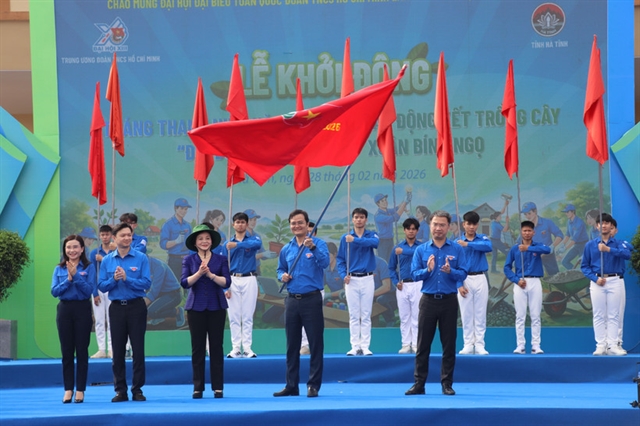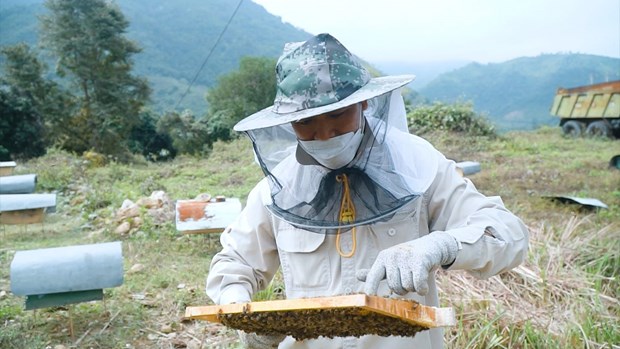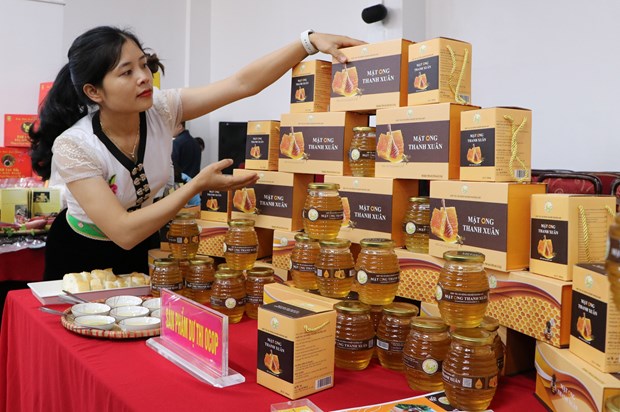 Society
Society


|
| A beekeeper checks a bee colony. VNA/VNS Photo Việt Hoàng |
Beekeeping is becoming a potential business opportunity for cooperatives and households in the northern mountain Lai Châu Province, helping locals better their quality of life.
In 2022, Mường Mít agricultural cooperative was established in Khoang Village to develop beekeeping and foster products under the national “one commune-one product” (OCOP) programme to enhance their value.
This is also the first establishment in the province to apply modern technology in wild bee breeding in order to have high-quality products for consumption.
Lò Thanh Xuân, the co-operative's director, said they have nine members and have built a reputation in the market in their first year.
In addition to investing in infrastructure and applying technology in harvesting, processing and preservation, the cooperative has also focused on building product labels and packaging as well as taking advantage of digital advertising platforms to introduce and promote its brand.
With 200 hives, the cooperative sold more than 2,000 litres of honey in 2022, creating a stable income for each member's household with VNĐ50-60 million (US$2,100-$2,500) per year.
Their Thanh Xuân honey brand was recognised as a three-star OCOP product in November last year.
In Pha Mu commune, harvesting honey in the forest has long been considered a traditional job for many local families.
Realising the high market demand, Thào A Tu from Pá Khoang Village, made 13 wooden hives to raise bees.
Some are in the forest and others are kept in his garden at home, Tu said.
Each year, his family can earn VNĐ10 million from selling honey.
Giàng A Phình, a resident from Hố Mít Commune, Tân Uyên District, has been honey bees in the forest for 16 years.
He recently increased his set-up to more than 100 hives.
With thousands of beehives in the whole commune, the amount of honey every year is large.
With the encouragement and orientation of the local authority, Hoàng Liên agriculture and tourism cooperative was established to help beekeepers develop their products.
Their honey has been recognised as a three-star OCOP product, which is the motivation for Phình and many households to continue to take advantage of the forest to develop sustainable beekeeping.
Beekeeping for honey has brought high economic efficiency and improved local lives in Than Uyên, Tân Uyên, Phong Thổ, Mường Tè and Nậm Nhùn districts.
Other districts also taking advantage of the forest to develop this farming model.
Beekeeping is being identified by Lai Châu Province as a new and sustainable economic direction to transform production methods and is one of the solutions to raise awareness of forest conservation among ethnic minorities in the locality.

|
| Honey products of Mường Mít agricultural cooperative. VNA/VNS Photo Photo Việt Hoàng |
The provincial People's Council has also added beekeeping to the concentrated agricultural development programme for the 2021-2025 period, attracting investment from co-operatives in raising bees and consuming products.
They will work with local authorities to successfully build the OCOP programme.
Lò Văn Hương, chairman of Than Uyên District People's Committee said the district has more than 1,800 hives, 800 of which have benefited from provincial support.
The cooperatives' honey products all achieve three OCOP stars and the district will call on more people to work with cooperatives to enhance their production and consumption, he said.
Director of Ong Vàng Cooperative in Bản Hon Commune, Tam Đường District, Nguyễn Thành Trung said the cooperative has transferred technology in farming for members and households.
With over 840 bee colonies, each year the unit collects 1,200 litres of honey with a revenue of over VNĐ500 million.
In 2021, the cooperative's honey products achieved 3-star OCOP products, so the consumer market has also expanded.
Up to now, the total number of bee colonies in the province has reached nearly 10,000.
To develop beekeeping sustainably, the province is encouraging local people to develop beekeeping in farm models and cooperatives to build linkages from production to consumption and brand for products. VNS

.jpg)


